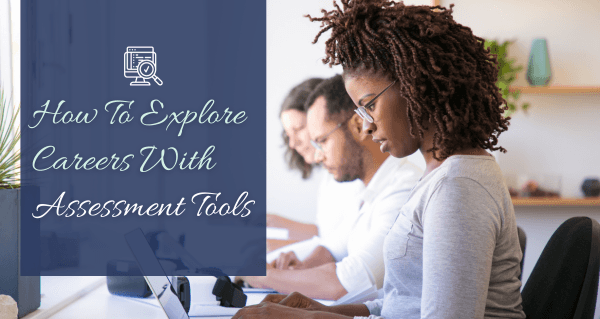
How To Explore Careers With Assessment Tools
Considering a career change is not a decision to make lightly. It’s daunting to navigate when there are uncertainties at every turn. A career change can come with a multitude of questions regarding your suitability for different roles, industries, and paths.
Amid these uncertainties, career assessments emerge as practical tools offering structured insights into one’s strengths, interests, and values. The Myers-Briggs Type Indicator (MBTI), StrengthsFinder, Strong Interest Inventory, DISC Assessment, and CareerLeader provide a systematic framework for professionals undergoing career transitions. Let’s break down how these assessments, by shedding light on personal attributes, facilitate informed decisions amidst the challenges of shifting professional trajectories.

This blog contains affiliate links, meaning I may receive a small commission (at no cost to you) if you subscribe or buy something through the links I share. I only share links to products or services that I use myself or absolutely love!
Benefits of Career Assessment Tools
Career assessment tools can be immensely beneficial when navigating career paths. These tools leverage various methodologies to help individuals identify their strengths, interests, values, and personality traits. By taking inventory of themselves, they can use that information to align their career choices more closely with their preferences and aspirations.
Key benefits of utilizing career assessment tools include:
- Self-awareness: These tools prompt introspection, fostering a deeper understanding of one’s skills, interests, and values. Gaining that self-awareness is crucial in making informed career decisions.
- Clarity and Direction: By highlighting strengths and preferences, these assessments provide clarity and direction. Individuals can make more informed decisions about education, training, or career changes.
- Exploration of Options: These tools offer insights into diverse career options, including those individuals might not have considered previously, expanding their horizons.
- Confidence Building: Facing an overwhelming amount of career possibilities without understanding one’s strengths and suitability can raise insecurity. When one understands oneself better, this can boost confidence when pursuing new opportunities or transitioning careers.
Popular Career Assessment Tools
There are many types of career assessment tools available on the internet nowadays which means it can be its own challenge to know where to start. Here are some popular career assessment tools to help you narrow down the options:
1 | Myers-Briggs Type Indicator (MBTI)
This assessment categorizes individuals into 16 personality types based on four dichotomies: Extraversion/Introversion, Sensing/Intuition, Thinking/Feeling, and Judging/Perceiving. It offers insights into how people perceive the world, make decisions, and interact with others.
Focus on understanding the cognitive functions of your personality type. Dive deeper into how your preferences for thinking, feeling, sensing, and intuition influence your decision-making and interactions. This insight will also help you understand which workplace environments and types of work are best suited for you.
Also, explore the nuances within your personality type. It helps to understand how your personality type may differ or overlap with others who share one of your four dichotomies. Knowing the patterns of how you respond to different situations will broaden your understanding of yourself.
Case Study: Sarah, a marketing professional, took the MBTI assessment and discovered she was an ENFJ (Extraverted, Intuitive, Feeling, Judging). Understanding her personality type helped her recognize her natural ability to connect with people and lead teams effectively. She shifted her focus towards leadership roles, enhancing her communication skills and fostering a more collaborative work environment.
2 | StrengthsFinder (CliftonStrengths)
The StrengthsFinder identifies an individual’s top strengths among 34 themes, providing insights into their unique talents and abilities.
Prioritize developing and leveraging your top strengths in your career. Explore how you can apply these strengths in your current role or future career paths to achieve greater satisfaction and success.
Then collaborate with others who possess different strengths. Complementing each other’s strengths in teamwork often leads to innovative solutions and enhances overall team
Case Study: Mark, an aspiring entrepreneur, underwent the StrengthsFinder assessment and found that his top strengths included Strategic Thinking and Communication. Recognizing these strengths, he tailored his business strategy to leverage his innovative thinking, effectively conveying his ideas to stakeholders, and leading to successful pitches and partnerships.
3 | Strong Interest Inventory
This assessment explores an individual’s interests across different occupational fields and provides insights into potential career paths that align with these interests. It categorizes preferences based on six themes: Realistic, Investigative, Artistic, Social, Enterprising, and Conventional (RIASEC).
Pay attention to your top interest areas and research careers aligned with these interests. Look for opportunities that merge your passions with potential professions to find fulfilling career paths.
But continuously reassess your interests. As your interests evolve, so might your career preferences. Regularly revisiting and updating your interests will provide a more accurate career trajectory.
Case Study: Emily, a college student, used the Strong Interest Inventory and discovered a strong preference for Investigative and Artistic themes. This encouraged her to explore careers in graphic design and scientific research, aligning with her interests in creative problem-solving and analytical thinking.
4 | DISC Assessment
This career assessment analyzes behavior and communication styles, categorizing individuals into Dominance, Influence, Steadiness, and Conscientiousness. It helps understand work preferences, interactions, and how individuals may approach tasks and relationships in professional settings.
Understand how your communication style (Dominance, Influence, Steadiness, Conscientiousness) impacts your interactions. Adapt your communication approach to suit different situations for improved collaboration. Being versatile in how you communicate based on the personalities of your colleagues or clients can significantly improve your effectiveness in various settings.
Case Study: John, a project manager, took the DISC assessment and identified himself as having a Steadiness and Conscientiousness style. Understanding his communication and work style preferences helped him adapt his management approach, fostering better teamwork and productivity among his diverse team members.
5 | CareerLeader
This assessment combines an individual’s interests, motivators, abilities, and career values to suggest personalized career recommendations. Particularly useful for MBA students and professionals, it offers insights into potential career paths and areas for development.
Use the assessment’s feedback on skills and values to target industries or roles that align with your strengths and values. Leverage this insight to tailor your resume and approach when exploring job opportunities.
You can also use the assessment as a conversation starter. Discuss your CareerLeader insights with mentors, career counselors, or industry professionals to gain diverse perspectives on potential career paths.
Case Study: Alex, an MBA candidate, utilized CareerLeader to explore career paths aligned with his skills and values. The assessment highlighted his aptitude for strategic planning and revealed a strong preference for leadership roles. This guided his internship search towards consulting firms, eventually leading to a fulfilling career in strategic management.
When exploring career paths, combining the results of multiple assessments or seeking guidance from career counselors can offer a more comprehensive understanding. Look for common threads and differences as well to form a clearer profile of you as a professional. Remember, these tools are simply guides. They don’t dictate or have the final say on your career path but rather, they assist in informed decision-making.
Interpreting and Analyzing Assessment Results
Now that the career assessments are taken, interpreting and analyzing the results effectively is crucial. The insight individuals take away from the results will assist them in making informed career decisions.
Some key steps to consider:
- Understand the Assessment’s Purpose: Before diving into results, grasp the assessment’s objective. Each assessment serves to reveal different aspects of an individual. Is it to identify strengths, explore interests, or evaluate personality types? Knowing this helps in contextualizing the outcomes.
- Avoid Feeling Confined: Assessment results provide insights but shouldn’t pigeonhole individuals into strict categories. They are guidelines, not definitive labels. This is just a starting point for self-reflection and exploration. Compare how the results line up with your self-perception. If something doesn’t feel right, you don’t have to embrace it.
- Consider the Whole Picture: Look at the overall assessment and how different aspects interrelate. Sometimes, strengths in one area can complement weaknesses in another.
- Professional Interpretation: For in-depth analysis, seek guidance from career counselors or coaches. Professionals can provide personalized insights and help navigate the results effectively.
- Application to Career Goals: Start aligning the assessment results with your career aspirations. Similar to the case studies above, look to see which careers align with your values and results. If someone values creativity and the assessment reflects this, explore careers that allow creative expression.
- Long-Term Development: Remember that self-discovery is an ongoing process and can evolve. Periodically take the assessments again to track personal growth and reassess career paths.
Identifying Strengths, Interests, and Values
Some of the benefits of career assessment tools include using the results to see the image they paint of you as a career professional and how they relate to one another. Identifying your strengths, interests, and values can significantly aid in career exploration.
1 | Strengths
Utilize assessment results from StrengthsFinder (CliftonStrengths) to identify top strengths. Focus on developing these strengths further, as they often indicate areas of natural talent and potential expertise.
Translate identified strengths into practical skills applicable to various roles. For instance, if leadership is a strength, explore management positions or team-oriented roles.
2 | Interests
Use assessment tools like the Strong Interest Inventory to uncover areas of interest across industries, tasks, and work environments. This aids in aligning personal passions with potential career paths. Dive deeper into industries or roles aligned with identified interests. Conduct informational interviews or shadow professionals in those fields to gain practical insights.
3 | Values
Assess personal values through reflection. Consider what work aspects are essential to you, such as autonomy, impact, or work-life balance. Ensure alignment between identified values and potential workplaces or industries. Seek environments that resonate with your values for greater job satisfaction.
Using assessments to identify strengths, interests, and values lays a robust foundation for targeted career exploration. You are encouraged to apply these insights actively and refine your understanding to make more informed and fulfilling career decisions.
How To Align Career Assessment Insights with Career Paths
Career assessments can guide individuals into looking introspectively to target and develop skills and interests that play to their strengths. Here are some ways to apply the insights gained toward your career goals:
- Assessment Review: Look for recurring themes or patterns across assessments. Highlight strengths, interests, and values that consistently emerge, indicating core aspects of your professional profile.
- Research and Exploration: Connect with professionals in fields of interest. Gain insights into their roles, industry trends, and day-to-day experiences to validate alignment with your assessment insights.
- Skill Enhancement and Development: Pursue further education or certifications that align with identified strengths and interests, enhancing your qualifications for targeted career paths.
- Networking and Experience Gathering: Engage with industry professionals, attend events, and participate in online forums related to your targeted career paths. Build relationships and seek mentorship to gain insights and opportunities. Gain hands-on experience in relevant fields through internships or volunteer work. Practical exposure can validate your interest and offer insights into day-to-day roles.
- Continuous Evaluation and Refinement: Incorporate feedback from mentors, managers, or colleagues to refine your alignment with suitable career paths continuously.
By holistically applying assessment insights to explore, validate, and adapt to suitable career paths, individuals can make informed decisions and pursue opportunities that align with their strengths, interests, and values.
Conclusion
Assessments for career exploration offer individuals invaluable insights into their strengths, interests, and values, acting as guiding lights rather than definitive roadmaps. These tools empower individuals to embark on a journey of self-discovery; but it's crucial to remember that these assessments serve as starting points, prompting research, networking, skill development, and real-world experiences to validate and refine identified pathways. The key lies in continuous reflection, adaptation, and remaining open to unexpected opportunities that may align with these insights. Ultimately, this approach enables individuals to make informed career decisions.
Related Articles
-

Career Transitions: Navigating Your Path to Success in Healthcare and Beyond
Guest blogger Sadie Smith shares how to leverage your existing skills and experience while pursuing new career opportunities in healthcare and other industries.
-

How To Showcase Transferable Skills And Your Value For A Career Transition
Recognizing the significance of transferable skills is key to successfully showcasing one's potential in the face of change.




